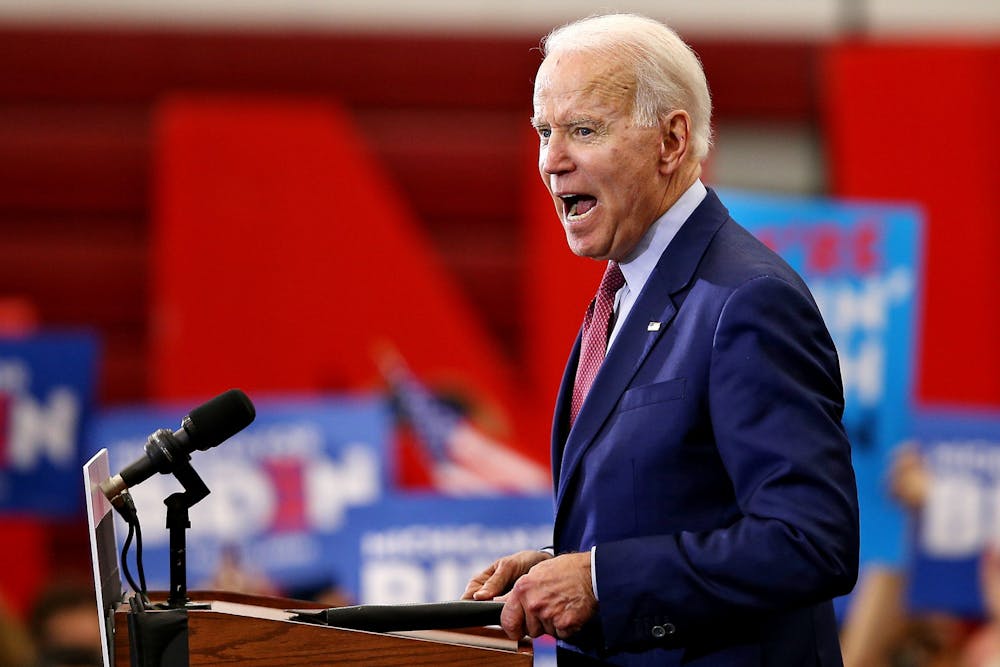Presumptive Democratic presidential nominee and former Vice President Joe Biden unveiled his new plan to combat climate change July 14 during a speech in Wilmington, Delaware. Centering environmental justice and investments in green jobs and infrastructure, Biden’s proposal is far more ambitious than what he has previously supported.
The plan’s reveal comes after Biden’s unity task force on climate, consisting of some of his own supporters along with some supporters of his former primary rival Sen. Bernie Sanders, I-Vt., released its environmental recommendations to the campaign. The task force was co-chaired by Rep. Alexandria Ocasio-Cortez, D-N.Y., a Sanders supporter and author of the Green New Deal, and John Kerry, the 2004 Democratic presidential nominee and a Biden supporter.
While his previous plan to tackle climate change left much to be desired, pushing many climate activists to support Sanders or Sen. Elizabeth Warren, D-Mass., over him in the primary, Biden’s new plan shows a huge, positive shift in how he plans to address the most existential threat facing humanity and leaves little question as to which major presidential candidate has the best interests of future generations at heart.
Historically, presumptive Democratic nominees for president either lock in on the platform they ran on in the primary or move toward the center in an attempt to appeal to moderate and independent voters. Biden, however, has done neither.
Instead, as a result of his unity task force on climate with the Sanders campaign and a desire to treat the issue with the urgency it deserves, he has moved further left and is now adopting the most progressive climate change plan ever supported by a major presidential candidate in the general election.
Along with rejoining the Paris Climate Agreement and addressing climate change as an existential threat rather than, in President Donald Trump’s words, “a hoax,” Biden’s plan also allocates $2 trillion toward goals like greatly increasing renewable technologies to generate power, building electric cars and an expansion of high-speed rail.
Most notable, perhaps, is the plan’s emphasis on environmental justice as a leading principle. Because Biden understands that low-income areas and communities of color are, and will continue to be, hit hardest by climate change, they will receive 40% of overall spending benefits in areas such as green housing, sustainable transportation and clean energy.
Under a Biden administration, the Justice Department would launch an Environmental and Climate Justice division to hold major polluters accountable, an idea that was first proposed by Washington Gov. Jay Inslee, whose short-lived presidential run was animated by the climate crisis. Inslee has endorsed Biden and called the plan “visionary.”
Biden’s new plan is vastly better than his previous one, but it doesn’t include everything progressives and climate activists were hoping it would. Though Biden has committed to prohibiting new fracking on public lands, he has still yet to endorse banning the practice all together, putting him at odds with progressives such as Sanders, Warren and Inslee.
Achieving net-zero emissions in the U.S. by 2050, as Biden hopes to do, is also fairly underwhelming, especially when considering that, in this scenario, polluters can still emit large amounts of greenhouse gases and simply offset them with actions such as planting trees. Sanders, in comparison, had called for a total decarbonization by 2050.
Despite all its flaws, though, Biden’s is still the most progressive climate plan to come from a major presidential candidate in American history. And when put up next to that of Trump, who promotes fossil fuel usage and has worked tirelessly for the last four years to dismantle any action taken by the Obama administration to combat climate change, there’s really no contest.
Jerrett Alexander (he/him) is a sophomore studying international relations and environmental sustainability. He sits on the Bloomington Commission on Sustainability.






